Media Effects Research Lab - Research Archive
The effects of personality on internet dependency
Student Researcher(s)
Jenny Gerrard (B.A. Candidate);
Laura Glickstein (B.A. Candidate);
Erin Kudrec (B.A. Candidate);
Faculty Supervisor
NTRODUCTION
The desirability of new online social networking can have different appeal to those of different personality types. Personalities influence people’s motives for the use of networks online to socially interact. Two major camps of thought have developed; one argues that a user’s personality will translate to the online world without any changes and the other theory argues that one’s personality will change and become more social when engaging in online communication.
RESEARCH QUESTION & HYPOTHESES
RQ: For college students, controlling for gender, what is the relationship between personality and internet use?
H1: People who are more open to experience are less internet dependent.
H2: People who are more conscientious are less internet dependent.
H3: People who are more extraverted are less internet dependent.
H4: People who are more agreeable are less internet dependent.
H5: People who are more neurotic are more internet dependent.
METHOD
Study respondents consisted of 230 Undergraduate Penn State Students (175 female and 55 male). Respondents ranged in ages from 18-24 years, and the median age was 21. The survey contained an official IRB consent form and two established surveys which contained 41 personality questions on a 5-point Likert scale and 20 internet addiction questions on a 10-point Likert scale. In addition to the established surveys six open-ended questions asked respondents to specify the number of minutes they spend daily on social networking sites and the last section of the survey concluded with an extra credit page that asked for course name and student email address. Various questions in each survey were schmushed based on a Cronbach’s alpha greater than .6.
RESULTS
All of our hypotheses were supported (p<.05) based on five simple linear regressions to test the five personality variables. Those who are higher on openness to experience, conscientiousness, agreeableness, and extraversion are less dependent on the Internet, while those who are high on neuroticism are more dependent on the Internet (see Figures 1-5). We ran a multiple regression test to look closer at our findings. This test revealed that neuroticism is the strongest predictor of Internet dependency.
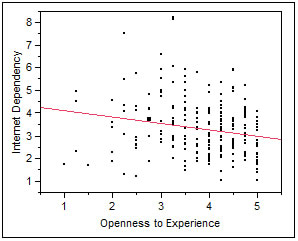
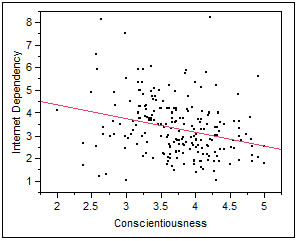
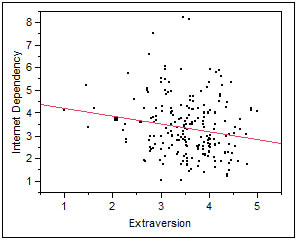
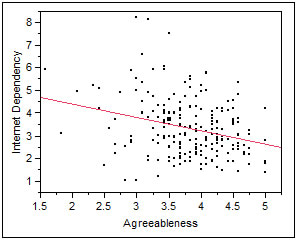
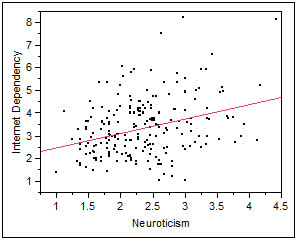
CONCLUSION
There were several internal and external limitations associated with our research, some of which include: sample demographics, length of survey, disproportionate gender sample, the use of established surveys, and self-reporting bias. Based on studies conducted by Kraut and Caplan, we conclude our research findings are more aligned with the work of Caplan.
For more details regarding the study contact
Dr. S. Shyam Sundar by e-mail at sss12@psu.edu or by telephone at (814) 865-2173

